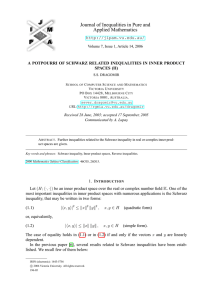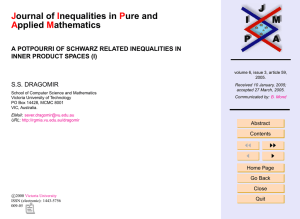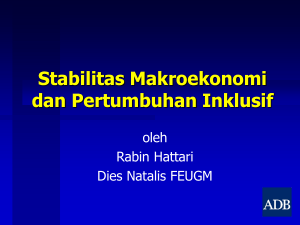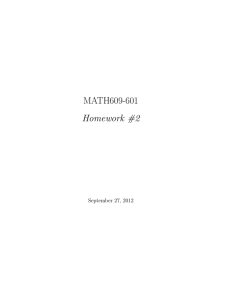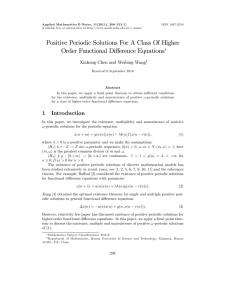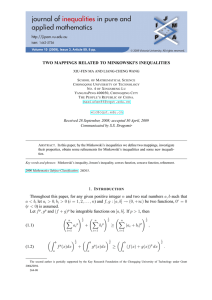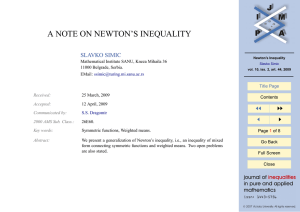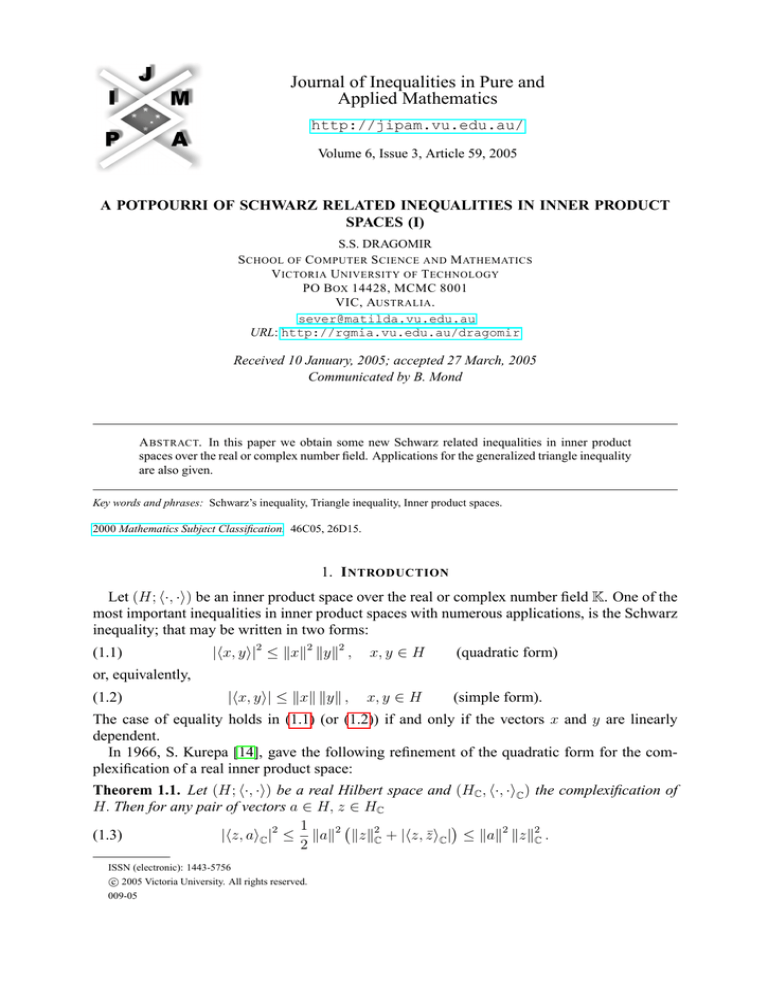
Journal of Inequalities in Pure and
Applied Mathematics
http://jipam.vu.edu.au/
Volume 6, Issue 3, Article 59, 2005
A POTPOURRI OF SCHWARZ RELATED INEQUALITIES IN INNER PRODUCT
SPACES (I)
S.S. DRAGOMIR
S CHOOL OF C OMPUTER S CIENCE AND M ATHEMATICS
V ICTORIA U NIVERSITY OF T ECHNOLOGY
PO B OX 14428, MCMC 8001
VIC, AUSTRALIA .
sever@matilda.vu.edu.au
URL: http://rgmia.vu.edu.au/dragomir
Received 10 January, 2005; accepted 27 March, 2005
Communicated by B. Mond
A BSTRACT. In this paper we obtain some new Schwarz related inequalities in inner product
spaces over the real or complex number field. Applications for the generalized triangle inequality
are also given.
Key words and phrases: Schwarz’s inequality, Triangle inequality, Inner product spaces.
2000 Mathematics Subject Classification. 46C05, 26D15.
1. I NTRODUCTION
Let (H; h·, ·i) be an inner product space over the real or complex number field K. One of the
most important inequalities in inner product spaces with numerous applications, is the Schwarz
inequality; that may be written in two forms:
(1.1)
|hx, yi|2 ≤ kxk2 kyk2 ,
x, y ∈ H
(quadratic form)
|hx, yi| ≤ kxk kyk ,
x, y ∈ H
(simple form).
or, equivalently,
(1.2)
The case of equality holds in (1.1) (or (1.2)) if and only if the vectors x and y are linearly
dependent.
In 1966, S. Kurepa [14], gave the following refinement of the quadratic form for the complexification of a real inner product space:
Theorem 1.1. Let (H; h·, ·i) be a real Hilbert space and (HC , h·, ·iC ) the complexification of
H. Then for any pair of vectors a ∈ H, z ∈ HC
1
(1.3)
|hz, aiC |2 ≤ kak2 kzk2C + |hz, z̄iC | ≤ kak2 kzk2C .
2
ISSN (electronic): 1443-5756
c 2005 Victoria University. All rights reserved.
009-05
2
S.S. D RAGOMIR
In 1985, S.S. Dragomir [2, Theorem 2] obtained a refinement of the simple form of the
Schwarz inequality as follows:
Theorem 1.2. Let (H; h·, ·i) be a real or complex inner product space and x, y, e ∈ H with
kek = 1. Then we have the inequality
(1.4)
kxk kyk ≥ |hx, yi − hx, ei he, yi| + |hx, ei he, yi| ≥ |hx, yi| .
For other similar results, see [8] and [9].
A refinement of the weaker version of the Schwarz inequality, i.e.,
Re hx, yi ≤ kxk kyk ,
(1.5)
x, y ∈ H
has been established in [5]:
Theorem 1.3. Let (H; h·, ·i) be a real or complex inner product space and x, y, e ∈ H with
kek = 1. If r1 , r2 > 0 and x, y ∈ H are such that
(1.6)
kx − yk ≥ r2 ≥ r1 ≥ |kxk − kyk| ,
then we have the following refinement of the weak Schwarz inequality
1 2
r2 − r12
(≥ 0) .
(1.7)
kxk kyk − Re hx, yi ≥
2
The constant 12 is best possible in the sense that it cannot be replaced by a larger quantity.
For other recent results see the paper mentioned above, [5].
In practice, one may need reverses of the Schwarz inequality, namely, upper bounds for the
quantities
kxk kyk − Re hx, yi ,
kxk2 kyk2 − (Re hx, yi)2
and
kxk kyk
Re hx, yi
or the corresponding expressions where Re hx, yi is replaced by either |Re hx, yi| or |hx, yi| ,
under suitable assumptions for the vectors x, y in an inner product space (H; h·, ·i) over the real
or complex number field K.
In this class of results, we mention the following recent reverses of the Schwarz inequality
due to the present author, that can be found, for instance, in the book [6], where more specific
references are provided:
Theorem 1.4. Let (H; h·, ·i) be an inner product space over K (K = C, R) . If a, A ∈ K and
x, y ∈ H are such that either
(1.8)
Re hAy − x, x − ayi ≥ 0,
or, equivalently,
1
A
+
a
x −
≤ |A − a| kyk ,
(1.9)
y
2
2
then the following reverse for the quadratic form of the Schwarz inequality
(1.10)
(0 ≤) kxk2 kyk2 − |hx, yi|2
2
41 |A − a|2 kyk4 − A+a
kyk2 − hx, yi
2
≤
1
|A − a|2 kyk4 − kyk2 Re hAy − x, x − ayi
4
1
≤ |A − a|2 kyk4
4
J. Inequal. Pure and Appl. Math., 6(3) Art. 59, 2005
http://jipam.vu.edu.au/
S CHWARZ R ELATED I NEQUALITIES
3
holds.
If in addition, we have Re (Aā) > 0, then
|A + a|
1 Re Ā + ā hx, yi
1
p
(1.11)
kxk kyk ≤ ·
≤ ·p
|hx, yi| ,
2
2
Re (Aā)
Re (Aā)
and
(1.12)
(0 ≤) kxk2 kyk2 − |hx, yi|2 ≤
1 |A − a|2
·
|hx, yi|2 .
4 Re (Aā)
Also, if (1.8) or (1.9) are valid and A 6= −a, then we have the reverse of the simple form of the
Schwarz inequality
Ā + ā
(0 ≤) kxk kyk − |hx, yi| ≤ kxk kyk − Re
(1.13)
hx, yi |A + a|
1 |A − a|2
Ā + ā
hx, yi ≤ ·
kyk2 .
≤ kxk kyk − Re
|A + a|
4 |A + a|
The multiplicative constants
1
4
and
1
2
above are best possible.
For some classical results related to the Schwarz inequality, see [1], [11], [15], [16], [17] and
the references therein.
The main aim of the present paper is to point out other results in connection with both the
quadratic and simple forms of the Schwarz inequality. As applications, some reverse results for
the generalised triangle inequality, i.e., upper bounds for the quantity
n
n
X X
(0 ≤)
kxi k − xi i=1
i=1
under various assumptions for the vectors xi ∈ H, i ∈ {1, . . . , n} , are established.
2. I NEQUALITIES R ELATED TO S CHWARZ ’ S
The following result holds.
Proposition 2.1. Let (H; h·, ·i) be an inner product space over the real or complex number field
K. The subsequent statements are equivalent.
(i) The following inequality holds
x
y (2.1)
kxk − kyk ≤ (≥) r;
(ii) The following reverse (improvement) of Schwarz’s inequality holds
1
(2.2)
kxk kyk − Re hx, yi ≤ (≥) r2 kxk kyk .
2
1
The constant 2 is best possible in (2.2).
Proof. It is obvious by taking the square in (2.2) and performing the required calculations.
Remark 2.2. Since
kkyk x − kxk yk = kkyk (x − y) + (kyk − kxk) yk
≤ kyk kx − yk + |kyk − kxk| kyk
≤ 2 kyk kx − yk
J. Inequal. Pure and Appl. Math., 6(3) Art. 59, 2005
http://jipam.vu.edu.au/
4
S.S. D RAGOMIR
hence a sufficient condition for (2.1) to hold is
r
kxk .
2
Remark 2.3. Utilising the Dunkl-Williams inequality [10]
a
1
b , a, b ∈ H\ {0}
(2.4)
ka − bk ≥ (kak + kbk) −
2
kak kbk kx − yk ≤
(2.3)
with equality if and only if either kak = kbk or kak+kbk = ka − bk , we can state the following
inequality
2
kx − yk
kxk kyk − Re hx, yi
, x, y ∈ H\ {0} .
(2.5)
≤2
kxk kyk
kxk + kyk
Obviously, if x, y ∈ H\ {0} are such that
kx − yk ≤ η (kxk + kyk) ,
(2.6)
with η ∈ (0, 1], then one has the following reverse of the Schwarz inequality
kxk kyk − Re hx, yi ≤ 2η 2 kxk kyk
(2.7)
that is similar to (2.2).
The following result may be stated as well.
Proposition 2.4. If x, y ∈ H\ {0} and ρ > 0 are such that
x
y (2.8)
kyk − kxk ≤ ρ,
then we have the following reverse of Schwarz’s inequality
(2.9)
The constant
1
2
(0 ≤) kxk kyk − |hx, yi| ≤ kxk kyk − Re hx, yi
1
≤ ρ2 kxk kyk .
2
in (2.9) cannot be replaced by a smaller quantity.
Proof. Taking the square in (2.8), we get
kxk2 2 Re hx, yi kyk2
2
+
2 −
2 ≤ ρ .
kxk
kyk
kyk
kxk
(2.10)
Since, obviously
kxk2 kyk2
(2.11)
2≤
+
kyk2 kxk2
with equality iff kxk = kyk , hence by (2.10) we deduce the second inequality in (2.9).
Remark 2.5. In [13], Hile obtained the following inequality
kxkv+1 − kykv+1
(2.12)
kkxk x − kyk yk ≤
kx − yk ,
kxk − kyk
provided v > 0 and kxk =
6 kyk .
If in (2.12) we choose v = 1 and take the square, then we get
v
(2.13)
v
kxk4 − 2 kxk kyk Re hx, yi + kyk4 ≤ (kxk + kyk)2 kx − yk2 .
Since,
kxk4 + kyk4 ≥ 2 kxk2 kyk2 ,
J. Inequal. Pure and Appl. Math., 6(3) Art. 59, 2005
http://jipam.vu.edu.au/
S CHWARZ R ELATED I NEQUALITIES
5
hence, by (2.13) we deduce
(2.14)
(0 ≤) kxk kyk − Re hx, yi ≤
1 (kxk + kyk)2 kx − yk2
·
,
2
kxk kyk
provided x, y ∈ H\ {0} .
The following inequality is due to Goldstein, Ryff and Clarke [12, p. 309]:
2r−2
kx − yk2 if r ≥ 1
r2 kxk
Re
hx,
yi
≤
(2.15)
kxk2r + kyk2r − 2 kxkr kykr ·
kxk kyk
kyk2r−2 kx − yk2
if r < 1
provided r ∈ R and x, y ∈ H with kxk ≥ kyk .
Utilising (2.15) we may state the following proposition containing a different reverse of the
Schwarz inequality in inner product spaces.
Proposition 2.6. Let (H; h·, ·i) be an inner product space over the real or complex number field
K. If x, y ∈ H\ {0} and kxk ≥ kyk , then we have
(2.16)
0 ≤ kxk kyk − |hx, yi| ≤ kxk kyk − Re hx, yi
r−1
1 2 kxk
r
kx − yk2 if r ≥ 1,
2
kyk
≤
1 kxk 1−r kx − yk2
if r < 1.
kyk
2
Proof. It follows from (2.15), on dividing by kxkr kykr , that
r−2
2
r r
r2 · kxk
if r ≥ 1,
r kx − yk
kyk
kxk
kyk
Re hx, yi
(2.17)
+
−2·
≤
kyk
kxk
kxk kyk
kykr−2 kx − yk2
if r < 1.
kxkr
Since
kxk
kyk
r
+
kyk
kxk
r
≥ 2,
hence, by (2.17) one has
2−2·
r−2
2
2 kxk
r kykr kx − yk if r ≥ 1,
Re hx, yi
≤
kxk kyk
kykr−2
kxkr
kx − yk2
if r < 1.
Dividing this inequality by 2 and multiplying with kxk kyk , we deduce the desired result in
(2.16).
Another result providing a different additive reverse (refinement) of the Schwarz inequality
may be stated.
Proposition 2.7. Let x, y ∈ H with y 6= 0 and r > 0. The subsequent statements are equivalent:
(i) The following inequality holds:
hx,
yi
x −
(2.18)
2 · y ≤ (≥) r;
kyk
(ii) The following reverse (refinement) of the quadratic Schwarz inequality holds:
(2.19)
kxk2 kyk2 − |hx, yi|2 ≤ (≥) r2 kyk2 .
J. Inequal. Pure and Appl. Math., 6(3) Art. 59, 2005
http://jipam.vu.edu.au/
6
S.S. D RAGOMIR
The proof is obvious on taking the square in (2.18) and performing the calculation.
Remark 2.8. Since
kyk2 x − hx, yi y = kyk2 (x − y) − hx − y, yi y ≤ kyk2 kx − yk + |hx − y, yi| kyk
≤ 2 kx − yk kyk2 ,
hence a sufficient condition for the inequality (2.18) to hold is that
r
(2.20)
kx − yk ≤ .
2
The following proposition may give a complementary approach:
Proposition 2.9. Let x, y ∈ H with hx, yi =
6 0 and ρ > 0. If
hx,
yi
≤ ρ,
x −
·
y
(2.21)
|hx, yi| then
(2.22)
The multiplicative constant
1
2
1
(0 ≤) kxk kyk − |hx, yi| ≤ ρ2 .
2
is best possible in (2.22).
The proof is similar to the ones outlined above and we omit it.
For the case of complex inner product spaces, we may state the following result.
Proposition 2.10. Let (H; h·, ·i) be a complex inner product space and α ∈ C a given complex
number with Re α, Im α > 0. If x, y ∈ H are such that
Im
α
x −
≤ r,
(2.23)
·
y
Re α then we have the inequality
(0 ≤) kxk kyk − |hx, yi| ≤ kxk kyk − Re hx, yi
1 Re α 2
≤ ·
·r .
2 Im α
The equality holds in the second inequality in (2.24) if and only if the case of equality holds in
(2.23) and Re α · kxk = Im α · kyk .
(2.24)
Proof. Observe that the condition (2.23) is equivalent to
(2.25)
[Re α]2 kxk2 + [Im α]2 kyk2 ≤ 2 Re α Im α Re hx, yi + [Re α]2 r2 .
On the other hand, on utilising the elementary inequality
(2.26)
2 Re α Im α kxk kyk ≤ [Re α]2 kxk2 + [Im α]2 kyk2 ,
with equality if and only if Re α · kxk = Im α · kyk , we deduce from (2.25) that
(2.27)
2 Re α Im α kxk kyk ≤ 2 Re α Im α Re hx, yi + r2 [Re α]2
giving the desired inequality (2.24).
The case of equality follows from the above and we omit the details.
The following different reverse for the Schwarz inequality that holds for both real and complex inner product spaces may be stated as well.
J. Inequal. Pure and Appl. Math., 6(3) Art. 59, 2005
http://jipam.vu.edu.au/
S CHWARZ R ELATED I NEQUALITIES
7
Theorem 2.11. Let (H; h·, ·i) be an inner product space over K, K = C, R. If α ∈ K\ {0} ,
then
0 ≤ kxk kyk − |hx, yi|
2
α
≤ kxk kyk − Re
hx, yi
|α|2
(2.28)
1 [|Re α| kx − yk + |Im α| kx + yk]2
·
2
|α|2
1
≤ · I 2,
2
≤
where
(2.29)
max {|Re α| , |Im α|} (kx − yk + kx + yk) ;
1
1
I :=
(|Re α|p + |Im α|p ) p (kx − ykq + kx + ykq ) q , p > 1,
1
+ 1q = 1;
p
max {kx − yk , kx + yk} (|Re α| + |Im α|) .
Proof. Observe, for α ∈ K\ {0} , that
kαx − ᾱyk2 = |α|2 kxk2 − 2 Re hαx, ᾱyi + |α|2 kyk2
= |α|2 kxk2 + kyk2 − 2 Re α2 hx, yi .
Since kxk2 + kyk2 ≥ 2 kxk kyk , hence
2
α
kαx − ᾱyk ≥ 2 |α| kxk kyk − Re
hx, yi .
|α|2
2
(2.30)
2
On the other hand, we have
kαx − ᾱyk = k(Re α + i Im α) x − (Re α − i Im α) yk
(2.31)
= kRe α (x − y) + i Im α (x + y)k
≤ |Re α| kx − yk + |Im α| kx + yk .
Utilising (2.30) and (2.31) we deduce the third inequality in (2.28).
For the last inequality we use the following elementary inequality
max {α, β} (a + b)
(2.32)
αa + βb ≤
1
1
p
(α + β p ) p (aq + bq ) q , p > 1, p1 +
1
q
= 1,
provided α, β, a, b ≥ 0.
The following result may be stated.
Proposition 2.12. Let (H; h·, ·i) be an inner product over K and e ∈ H, kek = 1. If λ ∈ (0, 1) ,
then
(2.33)
Re [hx, yi − hx, ei he, yi]
1
1
≤ ·
kλx + (1 − λ) yk2 − |hλx + (1 − λ) y, ei|2 .
4 λ (1 − λ)
The constant
1
4
is best possible.
J. Inequal. Pure and Appl. Math., 6(3) Art. 59, 2005
http://jipam.vu.edu.au/
8
S.S. D RAGOMIR
Proof. Firstly, note that the following equality holds true
hx − hx, ei e, y − hy, ei ei = hx, yi − hx, ei he, yi .
Utilising the elementary inequality
Re hz, wi ≤
1
kz + wk2 ,
4
z, w ∈ H
we have
Re hx − hx, ei e, y − hy, ei ei
1
=
Re hλx − hλx, ei e, (1 − λ) y − h(1 − λ) y, ei ei
λ (1 − λ)
1
1
≤ ·
kλx + (1 − λ) yk2 − |hλx + (1 − λ) y, ei|2 ,
4 λ (1 − λ)
proving the desired inequality (2.33).
Remark 2.13. For λ = 21 , we get the simpler inequality:
2
x + y 2 x + y
,
(2.34)
Re [hx, yi − hx, ei he, yi] ≤ −
,
e
2 2
that has been obtained in [6, p. 46], for which the sharpness of the inequality was established.
The following result may be stated as well.
Theorem 2.14. Let (H; h·, ·i) be an inner product space over K and p ≥ 1. Then for any
x, y ∈ H we have
(2.35)
0 ≤ kxk kyk − |hx, yi|
≤ kxk kyk − Re hx, yi
1
(kxk + kyk)2p − kx + yk2p p ,
1
≤ ×
2
1
kx − yk2p − |kxk − kyk|2p p .
Proof. Firstly, observe that
2 (kxk kyk − Re hx, yi) = (kxk + kyk)2 − kx + yk2 .
Denoting D := kxk kyk − Re hx, yi , then we have
(2.36)
2D + kx + yk2 = (kxk + kyk)2 .
Taking in (2.36) the power p ≥ 1 and using the elementary inequality
(2.37)
(a + b)p ≥ ap + bp ;
we have
(kxk + kyk)2p = 2D + kx + yk2
a, b ≥ 0,
p
≥ 2p Dp + kx + yk2p ,
giving
1 (kxk + kyk)2p − kx + yk2p ,
p
2
which is clearly equivalent to the first branch of the third inequality in (2.35).
With the above notation, we also have
Dp ≤
(2.38)
2D + (kxk − kyk)2 = kx − yk2 .
J. Inequal. Pure and Appl. Math., 6(3) Art. 59, 2005
http://jipam.vu.edu.au/
S CHWARZ R ELATED I NEQUALITIES
9
Taking the power p ≥ 1 in (2.38) and using the inequality (2.37) we deduce
kx − yk2p ≥ 2p Dp + |kxk − kyk|2p ,
from where we get the last part of (2.35).
3. M ORE S CHWARZ R ELATED I NEQUALITIES
Before we point out other inequalities related to the Schwarz inequality, we need the following identity that is interesting in itself.
Lemma 3.1. Let (H; h·, ·i) be an inner product space over the real or complex number field K,
e ∈ H, kek = 1, α ∈ H and γ, Γ ∈ K. Then we have the identity:
(3.1)
kxk2 − |hx, ei|2 = (Re Γ − Re hx, ei) (Re hx, ei − Re γ)
+ (Im Γ − Im hx, ei) (Im hx, ei − Im γ)
2
γ
+
Γ
− 1 |Γ − γ|2 .
+
x
−
e
2 4
Proof. We start with the following known equality (see for instance [3, eq. (2.6)])
h
i
(3.2)
kxk2 − |hx, ei|2 = Re (Γ − hx, ei) hx, ei − γ̄ − Re hΓe − x, x − γei
holding for x ∈ H, e ∈ H, kek = 1 and γ, Γ ∈ K.
We also know that (see for instance [4])
2
γ
+
Γ
1
2
(3.3)
− Re hΓe − x, x − γei = x − 2 e − 4 |Γ − γ| .
Since
h
i
(3.4)
Re (Γ − hx, ei) hx, ei − γ̄
= (Re Γ − Re hx, ei) (Re hx, ei − Re γ)
+ (Im Γ − Im hx, ei) (Im hx, ei − Im γ) ,
hence, by (3.2) – (3.4), we deduce the desired identity (3.1).
The following general result providing a reverse of the Schwarz inequality may be stated.
Proposition 3.2. Let (H; h·, ·i) be an inner product space over K, e ∈ H, kek = 1, x ∈ H and
γ, Γ ∈ K. Then we have the inequality:
2
γ
+
Γ
2
2
.
(3.5)
(0 ≤) kxk − |hx, ei| ≤ x
−
·
e
2
The case of equality holds in (3.5) if and only if
γ+Γ
γ+Γ
(3.6)
Re hx, ei = Re
,
Im hx, ei = Im
.
2
2
Proof. Utilising the elementary inequality for real numbers
1
αβ ≤ (α + β)2 ,
α, β ∈ R;
4
with equality iff α = β, we have
1
(3.7)
(Re Γ − Re hx, ei) (Re hx, ei − Re γ) ≤ (Re Γ − Re γ)2
4
J. Inequal. Pure and Appl. Math., 6(3) Art. 59, 2005
http://jipam.vu.edu.au/
10
S.S. D RAGOMIR
and
(Im Γ − Im hx, ei) (Im hx, ei − Im γ) ≤
(3.8)
1
(Im Γ − Im γ)2
4
with equality if and only if
Im Γ + Im γ
Re Γ + Re γ
and
Im hx, ei =
.
2
2
Finally, on making use of (3.7), (3.8) and the identity (3.1), we deduce the desired result (3.5).
Re hx, ei =
The following result may be stated as well.
Proposition 3.3. Let (H; h·, ·i) be an inner product space over K, e ∈ H, kek = 1, x ∈ H and
γ, Γ ∈ K. If x ∈ H is such that
(3.9)
Re γ ≤ Re hx, ei ≤ Re Γ
and
Im γ ≤ Im hx, ei ≤ Im Γ,
then we have the inequality
2
1
γ
+
Γ
2
(3.10)
kxk − |hx, ei| ≥ x − 2 e − 4 |Γ − γ| .
The case of equality holds in (3.10) if and only if
2
2
Re hx, ei = Re Γ or Re hx, ei = Re γ
and
Im hx, ei = Im Γ or Im hx, ei = Im γ.
Proof. From the hypothesis we obviously have
(Re Γ − Re hx, ei) (Re hx, ei − Re γ) ≥ 0
and
(Im Γ − Im hx, ei) (Im hx, ei − Im γ) ≥ 0.
Utilising the identity (3.1) we deduce the desired result (3.10). The case of equality is obvious.
Further on, we can state the following reverse of the quadratic Schwarz inequality:
Proposition 3.4. Let (H; h·, ·i) be an inner product space over K, e ∈ H, kek = 1. If γ, Γ ∈ K
and x ∈ H are such that either
Re hΓe − x, x − γei ≥ 0
(3.11)
or, equivalently,
1
γ
+
Γ
x −
≤ |Γ − γ| ,
e
2 2
(3.12)
then
(3.13)
(0 ≤) kxk2 − |hx, ei|2
≤ (Re Γ − Re hx, ei) (Re hx, ei − Re γ)
+ (Im Γ − Im hx, ei) (Im hx, ei − Im γ)
1
|Γ − γ|2 .
4
The case of equality holds in (3.13) if it holds either in (3.11) or (3.12).
≤
The proof is obvious by Lemma 3.1 and we omit the details.
J. Inequal. Pure and Appl. Math., 6(3) Art. 59, 2005
http://jipam.vu.edu.au/
S CHWARZ R ELATED I NEQUALITIES
11
Remark 3.5. We remark that the inequality (3.13) may also be used to get, for instance, the
following result
(3.14)
1
kxk2 − |hx, ei|2 ≤ (Re Γ − Re hx, ei)2 + (Im Γ − Im hx, ei)2 2
1
× (Re hx, ei − Re γ)2 + (Im hx, ei − Im γ)2 2 ,
that provides a different bound than 14 |Γ − γ|2 for the quantity kxk2 − |hx, ei|2 .
The following result may be stated as well.
Theorem 3.6. Let (H; h·, ·i) be an inner product space over K and α, γ > 0, β ∈ K with
|β|2 ≥ αγ. If x, a ∈ H are such that a 6= 0 and
12
2
|β|
−
αγ
β
x − a ≤
kak ,
α α
(3.15)
then we have the following reverses of Schwarz’s inequality
Re β · Re hx, ai + Im β · Im hx, ai
√
αγ
|β| |hx, ai|
≤ √
αγ
kxk kak ≤
(3.16)
and
(3.17)
|β|2 − αγ
|hx, ai|2 .
(0 ≤) kxk kak − |hx, ai| ≤
αγ
2
2
2
Proof. Taking the square in (3.15), it becomes equivalent to
|β|2
2
|β|2 − αγ
2
kxk − Re β̄ hx, ai + 2 kak ≤
kak2 ,
2
α
α
α
2
which is clearly equivalent to
(3.18)
α kxk2 + γ kak2 ≤ 2 Re β̄ hx, ai
= 2 [Re β · Re hx, ai + Im β · Im hx, ai] .
On the other hand, since
(3.19)
√
2 αγ kxk kak ≤ α kxk2 + γ kak2 ,
hence by (3.18) and (3.19) we deduce the first inequality in (3.16).
The other inequalities are obvious.
Remark 3.7. The above inequality (3.16) contains in particular the reverse (1.11) of the Schwarz
inequality. Indeed, if we assume that α = 1, β = δ+∆
, δ, ∆ ∈ K, with γ = Re (∆γ̄) > 0, then
2
2
2
the condition |β| ≥ αγ is equivalent to |δ + ∆| ≥ 4 Re (∆γ̄) which is actually |∆ − δ|2 ≥ 0.
With this assumption, (3.15) becomes
x − δ + ∆ · a ≤ 1 |∆ − δ| kak ,
2
2
J. Inequal. Pure and Appl. Math., 6(3) Art. 59, 2005
http://jipam.vu.edu.au/
12
S.S. D RAGOMIR
which implies the reverse of the Schwarz inequality
¯ + δ̄ hx, ai
Re ∆
q
kxk kak ≤
2 Re ∆δ̄
|∆ + δ|
≤ q
|hx, ai| ,
2 Re ∆δ̄
which is (1.11).
The following particular case of Theorem 3.6 may be stated:
Corollary 3.8. Let (H; h·, ·i) be an inner product space over K, ϕ ∈ [0, 2π), θ ∈ 0, π2 . If
x, a ∈ H are such that a 6= 0 and
kx − (cos ϕ + i sin ϕ) ak ≤ cos θ kak ,
(3.20)
then we have the reverses of the Schwarz inequality
kxk kak ≤
(3.21)
cos ϕ Re hx, ai + sin ϕ Im hx, ai
.
sin θ
In particular, if
kx − ak ≤ cos θ kak ,
then
kxk kak ≤
1
Re hx, ai ;
sin θ
and if
kx − iak ≤ cos θ kak ,
then
kxk kak ≤
1
Im hx, ai .
sin θ
4. R EVERSES OF THE G ENERALISED T RIANGLE I NEQUALITY
In [7], the author obtained the following reverse result for the generalised triangle inequality
n
n
X
X
(4.1)
kxi k ≥ xi ,
i=1
i=1
provided xi ∈ H, i ∈ {1, . . . , n} are vectors in a real or complex inner product (H; h·, ·i) :
Theorem 4.1. Let e, xi ∈ H, i ∈ {1, . . . , n} with kek = 1. If ki ≥ 0, i ∈ {1, . . . , n} are such
that
(4.2)
(0 ≤) kxi k − Re he, xi i ≤ ki
i ∈ {1, . . . , n} ,
for each
then we have the inequality
(4.3)
(0 ≤)
n
X
i=1
n
n
X
X
kxi k − xi ≤
ki .
i=1
i=1
The equality holds in (4.3) if and only if
n
n
X
X
(4.4)
kxi k ≥
ki
i=1
J. Inequal. Pure and Appl. Math., 6(3) Art. 59, 2005
i=1
http://jipam.vu.edu.au/
S CHWARZ R ELATED I NEQUALITIES
13
and
n
X
(4.5)
n
X
xi =
i=1
kxi k −
i=1
n
X
!
ki e.
i=1
By utilising some of the results obtained in Section 2, we point out several reverses of the
generalised triangle inequality (4.1) that are corollaries of Theorem 4.1.
Corollary 4.2. Let e, xi ∈ H\ {0} , i ∈ {1, . . . , n} with kek = 1. If
xi
(4.6)
for each
i ∈ {1, . . . , n} ,
kxi k − e ≤ ri
then
(4.7)
(0 ≤)
≤
n
X
n
X kxi k − xi i=1
n
X
1
2
i=1
ri2 kxi k
i=1
2 n
P
max ri
kxi k ;
1≤i≤n
i=1
p1 n
1q
1 P
n
P
q
2p
≤ ×
ri
kxi k
, p > 1,
2
i=1
i=1
n
P
max kxi k ri2 .
1≤i≤n
1
p
+
1
q
= 1;
i=1
Proof. The first part follows from Proposition 2.1 on choosing x = xi , y = e and applying
Theorem 4.1. The last part is obvious by Hölder’s inequality.
Remark 4.3. One would obtain the same reverse inequality (4.7) if one were to use Theorem
2.4. In this case, the assumption (4.6) should be replaced by
(4.8)
kkxi k xi − ek ≤ ri kxi k
for each
i ∈ {1, . . . , n} .
On utilising the inequalities (2.5) and (2.15) one may state the following corollary of Theorem
4.1.
Corollary 4.4. Let e, xi ∈ H\ {0} , i ∈ {1, . . . , n} with kek = 1. Then we have the inequality
n
n
X
X
(4.9)
(0 ≤)
kxi k − xi ≤ min {A, B} ,
i=1
where
A := 2
i=1
n
X
i=1
and
kxi k
kxi − ek
kxi k + 1
2
,
n
1 X (kxi k + 1)2 kxi − ek2
B :=
.
2 i=1
kxi k
For vectors located outside the closed unit ball B̄ (0, 1) := {z ∈ H| kzk ≤ 1} , we may state
the following result.
J. Inequal. Pure and Appl. Math., 6(3) Art. 59, 2005
http://jipam.vu.edu.au/
14
S.S. D RAGOMIR
Corollary 4.5. Assume that xi ∈
/ B̄ (0, 1) , i ∈ {1, . . . , n} and e ∈ H, kek = 1. Then we have
the inequality:
n
n
X
X
(4.10)
(0 ≤)
kxi k − xi i=1
i=1
1 P
n
2
p
kxi kp−1 kxi − ek2 , if p ≥ 1
2 i=1
≤
n
1P
kxi k1−p kxi − ek2 ,
if p < 1.
2 i=1
The proof follows by Proposition 2.6 and Theorem 4.1.
For complex spaces one may state the following result as well.
Corollary 4.6. Let (H; h·, ·i) be a complex inner product space and αi ∈ C with Re αi , Im αi >
0, i ∈ {1, . . . , n} . If xi , e ∈ H, i ∈ {1, . . . , n} with kek = 1 and
Im αi (4.11)
i ∈ {1, . . . , n} ,
xi − Re αi · e ≤ di ,
then
(4.12)
(0 ≤)
n
X
i=1
n
n
X
1X
Re αi 2
kxi k − xi ≤
·d .
2
Im αi i
i=1
i=1
The proof follows by Theorems 2.10 and 4.1 and the details are omitted.
Finally, by the use of Theorem 2.14, we can state:
Corollary 4.7. If xi , e ∈ H, i ∈ {1, . . . , n} with kek = 1 and p ≥ 1, then we have the
inequalities:
n
n
X
X
(4.13)
(0 ≤)
kxi k − xi i=1
i=1
P
n 1
2p
2p p
(kx
k
+
1)
−
kx
+
ek
,
i
i
1 i=1
≤ ×
2
n 1
P
kxi − ek2p − |kxi k − 1|2p p .
i=1
R EFERENCES
[1] M.L. BUZANO, Generalizzazione della disiguaglianza di Cauchy-Schwarz (Italian), Rend. Sem.
Mat. Univ. e Politech. Torino, 31 (1971/73), 405–409 (1974).
[2] S.S. DRAGOMIR, Some refinements of Schwarz inequality, Simposional de Matematică şi Aplicaţii, Polytechnical Institute Timişoara, Romania, 1-2 November, 1985, 13-16. ZBL 0594.46018.
[3] S.S. DRAGOMIR, A generalisation of Grüss’ inequality in inner product spaces and applications,
J. Mathematical Analysis and Applications, 237 (1999), 74-82.
[4] S.S. DRAGOMIR, Some Grüss type inequalities in inner product spaces, J. Inequal. Pure & Appl.
Math., 4(2) (2003), Article 42. [ONLINE: http://jipam.vu.edu.au/article.php?
sid=280].
[5] S.S. DRAGOMIR, Refinements of the Schwarz and Heisenberg inequalities in Hilbert spaces,
RGMIA Res. Rep. Coll., 7(E) (2004), Article 19. [ONLINE: http://rgmia.vu.edu.au/
v7(E).html].
J. Inequal. Pure and Appl. Math., 6(3) Art. 59, 2005
http://jipam.vu.edu.au/
S CHWARZ R ELATED I NEQUALITIES
15
[6] S.S. DRAGOMIR, Advances in Inequalities of the Schwarz, Grüss and Bessel Type in Inner Product
Spaces, Nova Science Publishers, Inc., New York, 2005.
[7] S.S. DRAGOMIR, Reverses of the triangle inequality in inner product spaces, RGMIA Res. Rep.
Coll., 7(E) (2004), Article 7. [ONLINE: http://rgmia.vu.edu.au/v7(E).html].
[8] S.S. DRAGOMIR AND B. MOND, On the superadditivity and monotonicity of Schwarz’s inequality in inner product spaces, Contributios, Macedonian Acad. Sci. Arts., 15(2) (1994), 5–22.
[9] S.S. DRAGOMIR AND J. SÁNDOR, Some inequalities in perhilbertian spaces, Studia Univ. BabeşBolyai, Math., 32(1) (1987), 71–78. MR 894:46034.
[10] C.F. DUNKL AND K.S. WILLIAMS, A simple norm inequality, Amer. Math. Monthly, 71(1)
(1964), 43–54.
[11] M. FUJII AND F. KUBO, Buzano’s inequality and bounds for roots of algebraic equations, Proc.
Amer. Math. Soc., 117(2) (1993), 359–361.
[12] A.A. GOLDSTEIN, J.V. RYFF
(1968), 309.
AND
L.E. CLARKE, Problem 5473, Amer. Math. Monthly, 75(3)
[13] G.N. HILE, Entire solution of linear elliptic equations with Laplacian principal part, Pacific J.
Math., 62 (1976), 127–148.
[14] S. KUREPA, On the Buniakowsky-Cauchy-Schwarz inequality, Glasnik Mat. Ser. III, 1(21) (1966),
147–158.
[15] J.E. PEČARIĆ, On some classical inequalities in unitary spaces, Mat. Bilten, 16 (1992), 63–72.
[16] T. PRECUPANU, On a generalisation of Cauchy-Buniakowski-Schwarz inequality, Anal. St. Univ.
“Al. I. Cuza” Iaşi, 22(2) (1976), 173–175.
[17] U. RICHARD, Sur des inégalités du type Wirtinger et leurs application aux équations différentielles
ordinaires, Collquium of Analysis held in Rio de Janeiro, August, 1972, pp. 233–244.
J. Inequal. Pure and Appl. Math., 6(3) Art. 59, 2005
http://jipam.vu.edu.au/

